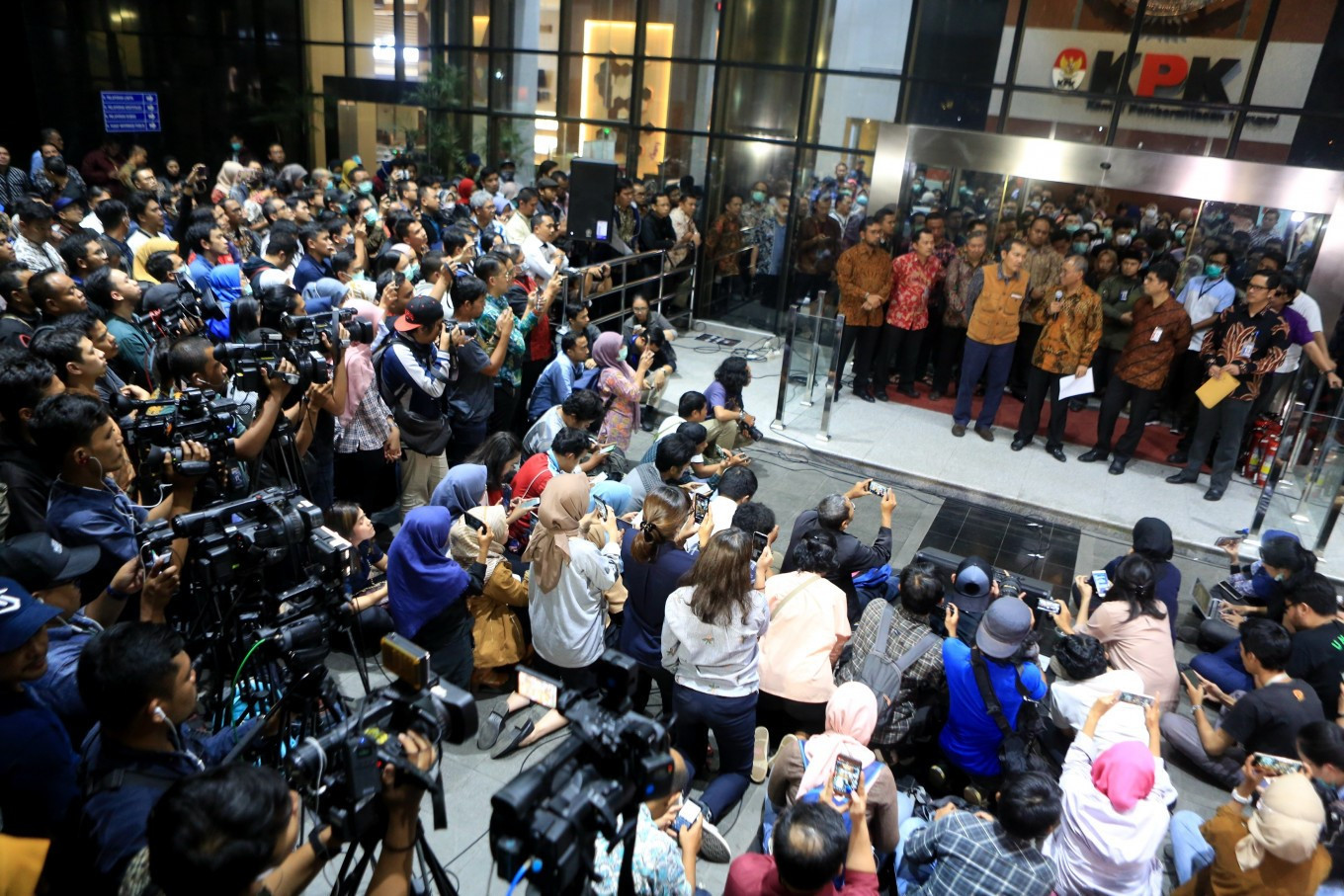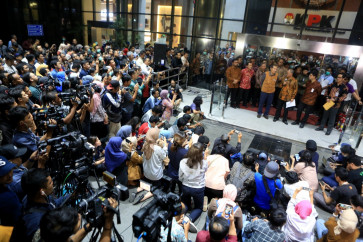Popular Reads
Top Results
Can't find what you're looking for?
View all search resultsPopular Reads
Top Results
Can't find what you're looking for?
View all search resultsAnalysis: Paulus Tannos a litmus test for Indonesia’s fight against corruption
Change text size
Gift Premium Articles
to Anyone
 We’re done here: Corruption Eradication Commission (KPK) chairman Agus Rahardjo, accompanied by KPK commissioners Saut Situmorang and Laode Muhammad Syarif, speaks to journalists in a press conference at the KPK headquarters in South Jakarta on Friday. They handed back their mandates for KPK leadership to President Joko “Jokowi” Widodo to express their disappointment over his support for the planned revision of the KPK Law. (JP/Seto Wardhana (JP/Seto Wardhana)
We’re done here: Corruption Eradication Commission (KPK) chairman Agus Rahardjo, accompanied by KPK commissioners Saut Situmorang and Laode Muhammad Syarif, speaks to journalists in a press conference at the KPK headquarters in South Jakarta on Friday. They handed back their mandates for KPK leadership to President Joko “Jokowi” Widodo to express their disappointment over his support for the planned revision of the KPK Law. (JP/Seto Wardhana (JP/Seto Wardhana)
T
he recent capture of Paulus Tannos in Singapore has reignited the nation’s longstanding concerns of failing to catch graft convicts who fled abroad and bring them to justice. The Corruption Eradication Committee (KPK) and other government bodies are now rushing to extradite Paulus under a bilateral treaty agreement between Indonesia and Singapore that took effect last year. If extradited, Paulus would be the first fugitive to be brought back into Indonesia under this newly enacted agreement.
Paulus Tannos, who also goes by Thian Po Thjin, was captured by the Singaporean Corrupt Practices Investigation Bureau on Jan. 17 after being on the run for the last five years. Paulus then filed for pretrial in Singapore. Per the request of the KPK, local authorities have placed the fugitive under provisional arrest until March 3. The Indonesian government must submit all the necessary documents by then to complete the extradition process or risk letting Paulus free.
Law Minister Supratman Andi Atgas has assigned a task force consisting of officials from multiple government bodies, including the KPK, National Police, Attorney General’s Office and the Foreign Ministry to spearhead this extradition case. With Indonesia having only completed four extradition cases to date, this extradition case raises serious doubts about the nation’s ability to manage international cases like this, especially with other fugitives like Harun Masiku still on the run. Several other corruption suspects are known to reside in Singapore, but the government could not bring them back home.
In 2022, Indonesia and Singapore brokered an extradition treaty which was later ratified in 2023. The deal faced initial criticism of compromising national sovereignty when details emerged that Indonesia had agreed to provide land access to Singapore for military training purposes in return for an agreement. Now, the Indonesian government has a chance to redeem itself with the capture of Paulus.
Analysts have pointed to three main challenges as KPK and government officials seek to extradite Paulus, who is keen on delaying this process given Singapore’s tight 45-day window between the start and end of his detention. First, Paulus can continue to deny his involvement in the e-ID corruption case. Second, Paulus may cite concerns over his personal safety if returned to Indonesia. Lastly, murmurs have gone around that Paulus is in the midst of swapping his Indonesian nationality for Guinea-Bisseau.
If Paulus were to be let loose it would become even more “difficult” to re-capture him as he can freely move around with his newly acquired passport, one analyst mentions.
Moreover, one government opposition figure from the Indonesian Democratic Party of Struggle (PDI-P) Andreas Hugo Pareira, has called on all the state officials involved in the case to “move fast” in capturing Paulus, who has twice now attempted to change his nationality. “If you wait for Paulus Tannos to become a citizen of another country, that shows we're not being serious," said the politician.


















